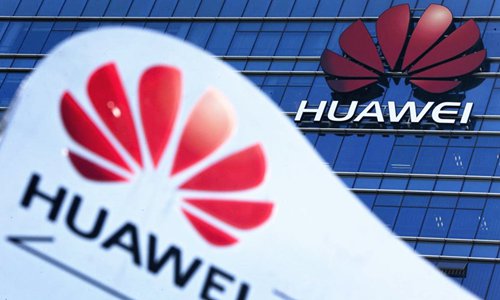
The logo of China's tech giant Huawei. Photo: Xinhua
The US Department of Commerce announced Monday that it will extend a temporary license loosening restrictions on business deals with Chinese tech giant Huawei for another 90 days.
It is the third time that the US government allowed the US firms to get 90-day extension to have "specific, limited engagements in transactions" with Huawei since the Chinese tech giant was put on the Entity List over the so-called "national security concerns," in May.
The department issued 90-day temporary licenses on May 20 and August 19 respectively, to ease off part of those export restrictions.
"The Temporary General License (TGL) extension will allow carriers to continue to service customers in some of the most remote areas of the United States who would otherwise be left in the dark," said US Secretary of Commerce Wilbur Ross in a statement on Monday.
Ross also told Fox Business Network on Friday that some US rural carriers are dependent on Huawei for their 3G and 4G networks, so the main purpose of the temporary licenses is to let those rural carriers continue to operate.
Outside of the TGL scope, any exports, reexports, or in-country transfers of items subject to the Export Administration Regulations (EAR) will continue to require a license, if granted, after a review by the Bureau of Industry and Security (BIS) under a presumption of denial, according to the department.
Huawei said in a statement on May 20 that the US export control decision is in no one's interest and will do significant economic harm to the American companies with which Huawei does business.
Restricting Huawei from doing business in the United States will "only serve to limit the US to inferior yet more expensive alternatives, leaving the US lagging behind in 5G deployment, and eventually harming the interests of US companies and consumers," said Huawei.
Huawei's chairman Liang Hua said on Monday at the CNBC East Tech West conference in Guangzhou that the extension's real impact on Huawei is very limited since Huawei's products are able to be shipped without the reliance on the US components and chips, CNBC reported.
In an August statement, Huawei noted that "the extension of the Temporary General License does not change the fact that Huawei has been treated unjustly," and the company called on the US government to put an end to this unjust treatment and remove Huawei from the Entity List.
Chinese Foreign Ministry has repeatedly urged the United States to stop its unjustifiable bashing of Chinese enterprises, including Huawei, and to treat Chinese companies in a fair, just and non-discriminatory way.
On October 29, Chinese foreign ministry spokesperson urged the United States to stop generalizing the concept of national security and unreasonably suppressing certain Chinese companies.
"We firmly oppose the United States abusing its state power and suppressing particular Chinese companies without any evidence. Such economic bullying behavior goes against the principle of market economy which the United States has always claimed to champion, nor shall it win the support of the international community," spokesperson Geng Shuang said at the press briefing.
